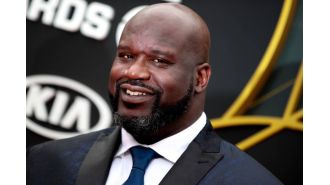Border Patrol Condemns Secret Facebook Group, but Reveals Few Specifics
The agency won’t say how many employees have been disciplined or warned in the ongoing scandal over offensive social media posts.

Long known for its insular culture and tendency toward secrecy, the U.S. Customs and Border Protection agency is saying little in the aftermath of news reports exposing a vulgar and hateful Facebook group for current and retired Border Patrol agents, including supervisors.
While CBP officials have publicly condemned the offensive social media posts, they’ve disclosed few details about the steps the agency has taken to identify employees who behaved inappropriately online and hold them accountable.
The agency, which is responsible for policing the nation’s borders and official ports of entry, declined to say how many employees CBP has disciplined or how many remain under investigation.
In response to questions from ProPublica, a CBP spokesperson would only say that “several” employees had been placed on restricted duty as a result of postings in the three-year-old Facebook group, and that so far no one had been suspended from the patrol, a more serious disciplinary action. The agency would not say whether the agents now on restricted duty are allowed to have contact with the public, and it refused to answer questions about specific agents who appear to have made posts celebrating sexual violence and demeaning migrants and women.
The “majority of employees who have been positively identified” as being active in the Facebook group have been issued letters instructing them stop posting objectionable material, said the spokesperson, who declined to specify how many people had received the letters, described as “cease and desist” notices.
“This secrecy is unacceptable,” said Joaquin Castro, chair of the Congressional Hispanic Caucus and representative for San Antonio. “This secrecy is dangerous to human life. CBP is perhaps the least transparent law enforcement agency in the country.”
ProPublica last week revealed the existence of the secret 9,500-member Facebook group, called “I’m 10-15,” a reference to the Border Patrol code for “alien in custody.” In the private group, current and former Border Patrol agents, including supervisors, mocked dead migrants, called congresswomen “scum buckets,” and uploaded misogynistic images, including an illustration of New York Rep. Alexandria Ocasio-Cortez, a harsh critic of CBP, engaged in oral sex with a migrant in a detention facility. A later story by The Intercept published additional graphic posts from the group and information about its members.
CBP policies bar employees from making “abusive, derisive, profane, or harassing statements or gestures” about any person or group on private or public social media.
Among those who apparently made egregious posts is Thomas Hendricks, a 20-year veteran of the Border Patrol who serves as a supervisor of the Calexico station, a desert outpost in Southern California’s Imperial County. Hendricks — or someone using his Facebook account — uploaded a photo illustration of President Donald Trump forcing the head of Ocasio-Cortez toward his crotch. The image was accompanied by a cryptic message that appeared to refer to prior issues within the patrol: “That’s right bitches. The masses have spoken and today democracy won. I have returned.”
Hendricks did not respond to requests for comment from ProPublica.
An agent at the Alamogordo station in New Mexico, Mario Marcus Ponce, apparently described Ocasio-Cortez and Rep. Veronica Escobar of El Paso, Texas, both Democrats, as “hoes” in a discussion in the Facebook group. Ponce did not answer calls and text messages from ProPublica.
CBP would not discuss the current status of Hendricks and Ponce or two other agents identified by ProPublica. “We cannot comment on individual cases,” the CBP spokesperson said.
Unlike many big city police departments, the Border Patrol generally divulges little information about agents found to have engaged in misconduct or those involved in shooting incidents. At times, the agency has refused even to reveal the names of agents facing trial on criminal corruption charges.
“They are not used to being questioned. They are not used to be scrutinized,” said Josiah Heyman, an anthropologist at the University of Texas at El Paso who has been studying the border since 1982.
The Facebook group, he said, is “an indicator of broader problems” within the Border Patrol. “There is an attitude within CBP and Border Patrol that everybody crossing the border is invading the United States and coming to do bad things,” he said.
While Heyman noted that there is little solid statistical data on the views held by Border Patrol agents, he pointed to a survey of approximately 1,100 migrants who’d been deported to Mexico. Nearly a quarter of the respondents said they’d been verbally abused by U.S. government employees, primarily Border Patrol. “It is an enormous number,” said Heyman, director of the school’s Center for Inter-American and Border Studies.
In a statement issued last week, Border Patrol Chief Carla Provost said the Facebook images and comments aren’t representative of the patrol as a whole. “These posts are completely inappropriate and contrary to the honor and integrity I see—and expect—from our agents day in and day out,” she said. “Any employees found to have violated our standards of conduct will be held accountable.”
At least two oversight bodies are now looking into the conduct of Border Patrol agents on social media. One inquiry is being led by CBP’s Office of Professional Responsibility, essentially an internal affairs unit staffed with professional investigators.
In Congress, the House Committee on Oversight and Reform, led by Maryland Democrat Elijah Cummings has opened an investigation and committee staffers are currently gathering facts. Cummings has requested that Kevin McAleenan, the acting chief of the Department of Homeland Security — CBP’s parent organization — testify before the committee this week about “racist, sexist, and xenophobic posts by Border Patrol agents,” as well as reports of inhumane conditions and severe overcrowding at CBP detention facilities.
The congressman has also instructed Facebook to turn over digital evidence related to the group. “The Committee requests that you preserve all documents, communications, and other data related to the ‘I’m 10-15’ group. This includes log files and metadata,” Cummings wrote in a letter to Facebook chief Mark Zuckerberg.
At the House Homeland Security Committee, chair Bennie Thompson, a Mississippi Democrat, has called on the inspector general for the Department of Homeland Security to mount an investigation into the Facebook group.
The inspector general’s office would not comment on whether it has opened an inquiry.
For his part, Castro said he intends to ask some questions of his own. “I am going to set up a call with Secretary McAleenan to have a conversation about the discipline and accountability process within DHS,” Castro, a Democrat, said. “I don’t know if there is any accountability. I don’t know if there is any discipline.”






